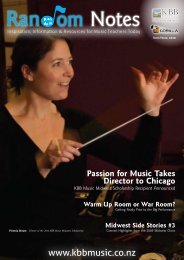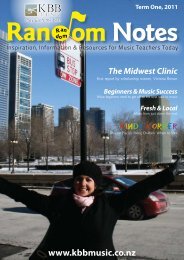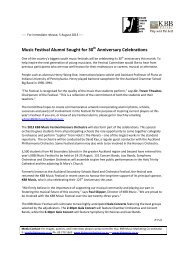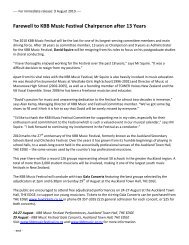choral briefs midwest clinic performance anxiety - KBB Music
choral briefs midwest clinic performance anxiety - KBB Music
choral briefs midwest clinic performance anxiety - KBB Music
Create successful ePaper yourself
Turn your PDF publications into a flip-book with our unique Google optimized e-Paper software.
Do You Hear<br />
What I Hear?<br />
Michelle Flint from St Paul’s Collegiate School<br />
traveled to the world's largest music education<br />
conference in Chicago on the <strong>KBB</strong> <strong>Music</strong> Midwest<br />
Scholarship in December 2011.<br />
Michelle Flint<br />
While there she was most inspired by <strong>clinic</strong>ian<br />
Richard Floyd's seminar on Do You Hear What I Hear?<br />
The ear can’t hear what the mind can’t imagine”<br />
- Gunther Schuller<br />
The Lion in the Rock<br />
A man was carving a stone and a little boy was watching,<br />
curious to see what the man was doing. “Sir, what are you<br />
doing?” asked the little boy. “You may stay there and<br />
watch”, said the man, “but you must not say a word”. The<br />
boy watched the man carving away at the stone. Each<br />
day he visited the man to see the progress he had made.<br />
Finally, after many days, the carving was finished. The little<br />
boy approached the man and did not say a word. “Don’t<br />
you have anything to say?" asked the man. “You told me<br />
to stay quiet”, said the boy. “Do you not have anything<br />
to ask me about the work I have done?” replied the man.<br />
“Yes”, said the boy. “How did you know that lion was<br />
inside that rock?”<br />
Richard Floyd<br />
Richard Floyd, UIL State Director of <strong>Music</strong> at the University<br />
of Texas was one of the most inspiring <strong>clinic</strong>ians at the<br />
Midwest Clinic in Chicago during my visit in December<br />
last year. The conference offers a plethora of <strong>clinic</strong>s,<br />
concerts and rehearsal labs which offer outstanding<br />
educational <strong>clinic</strong>s, concert <strong>performance</strong>s and an exhibit<br />
hall that highlights all the latest “cutting-edge” materials in the<br />
music world. With the assistance of the United States Army Band<br />
the <strong>clinic</strong>, offered by Richard Floyd, focussed on the multiple kinds<br />
of listening that are critical factors in determining the effectiveness<br />
of rehearsals, offering strategies to refine these proficiencies.<br />
Tuning<br />
Richard began with a focus on tuning. He said that it is important<br />
to instruct the ears to listen and that playing in tune is to ‘serve the<br />
music’ not just for the sake of playing in tune, this is meaningless.<br />
We all listen for different things and perfect intonation is virtually<br />
unattainable, especially on a brass instrument. <strong>Music</strong>ians have<br />
to constantly adjust (tuning slides etc) to ‘create the illusion of<br />
perfection’. Rehearsals should begin with ‘Inclusive Listening’<br />
using chords based on root “C”, so, C Major, C Minor, C Dim, C<br />
Aug, all of the above plus an added 6th, 7th, maj, min, dominant,<br />
diminished etc. When tuning the chord always tune the root first,<br />
followed by the 5th and finally the 3rd. The goal is to move the ear<br />
from ‘Unconscious Incompetence’ (not hearing) to ‘Unconscious<br />
Competence’ (hearing it and doing something about it).<br />
10 Random Notes <strong>Music</strong>al Instrument Specialists since 1888
















